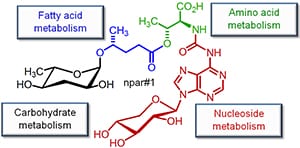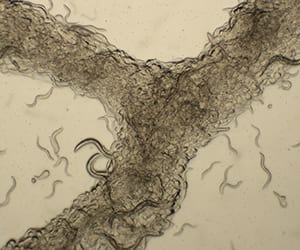News
Schroeder Lab: Answering Life’s Biggest Questions with Small Molecules

All major metabolic pathways contribute building blocks to this lifespan-increasing signaling molecule, named npar#1
Thanks to modern medicine, we live longer today than ever before in human history. But science, says BTI researcher Frank Schroeder, has still not been able to prevent many illnesses associated with aging, such as diabetes or Alzheimer’s disease. He believes the missing links may be biogenic small molecules, organic chemical compounds with low molecular weight but high importance. Schroeder’s lab is focused on the role small molecules play in determining human life span and age-related diseases.
“Small molecules are the messengers that connect different genes and proteins together, inside an organism and across different organisms,” said Schroeder.
Small molecules first took the stage in the late 1930s with the discovery of sex hormones. Soon, the tidal wave of molecular biology came, with its rapid advances in gene and protein sequencing techniques. Small molecules took a back seat, but Schroeder said it turned out genes didn’t tell scientists as much about human biology as they’d hoped.
“We thought genes would tell us how and why humans get sick, or age a certain way. But that has not happened because genes interact with small molecules, most of which we didn’t even know existed up until a few years ago,” he said.
Schroeder’s lab is working to discover new small molecules and identify their structure and function in the context of aging. To do this, he’s using the well-studied microscopic worm Caenorhabditis elegans as a model organism. Through C. elegans, Schroeder found that small molecules produced by male worms controlled key aspects of aging in separate hermaphrodite worms. Schroeder said many of the compounds his lab is identifying have direct relevance for human health, as they form signaling pathways in the body that regulate physiology, lifespan and disease.
Because 95 percent of the chemicals in our bodies are unknown, Schroeder said that finding and elucidating the function of small molecules requires his students and postdoctoral fellows to work long hours, be creative and be fully engaged. Members of Schroeder’s lab invest significant time developing novel tools and techniques, and must take a flexible approach to problem solving.
“When we go into these systems, we know everything we see will be unknown, pure discovery,” said Schroeder. “It requires me, as group leader, to constantly remind people of the need to keep focused on what is relevant. It’s pretty intense. We get to the bottom of things.”
Schroeder presentation about small molecules



